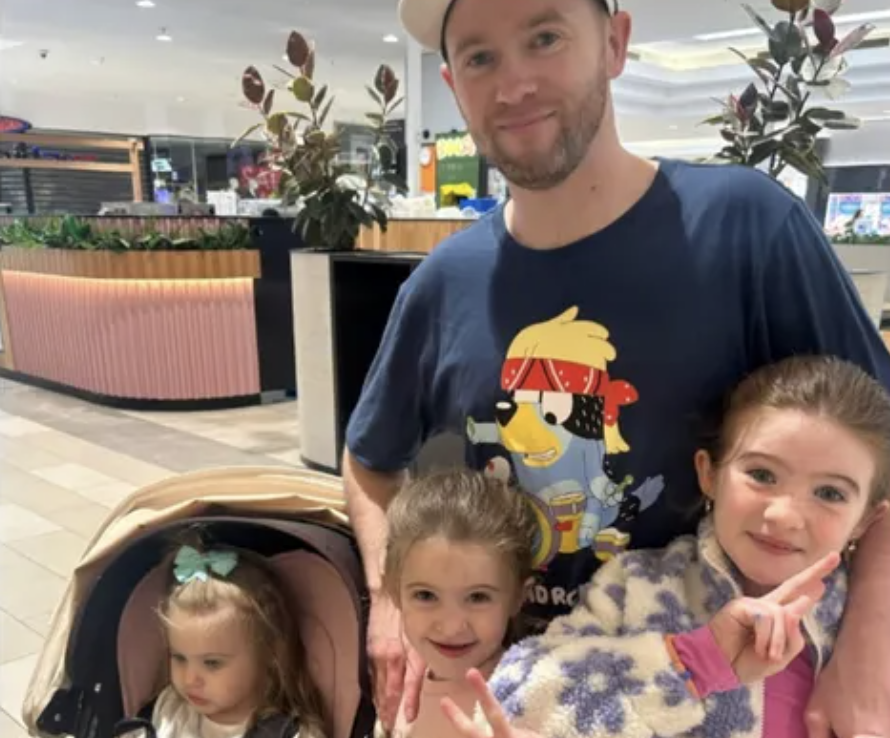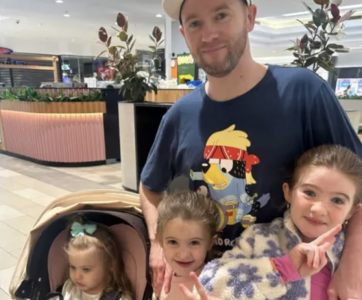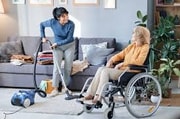

The call that shattered Ashlee Tyrrell's world started like so many others. Her partner Shaun was at home with their two youngest daughters when his heart device 'went off.'
At 32, Ashlee had grown accustomed to these occasional alerts over their 13 years together — Shaun's hypertrophic cardiomyopathy had been so well-managed since his teenage diagnosis that they barely thought about it anymore.
Ashlee, who had recently returned to work at Baby Bunting after almost a decade at home raising their three daughters, was just days into her new job when the call came.
Shaun, 36, told her his pacemaker had gone off. Diagnosed with cardiomyopathy at 17 after collapsing during a basketball game, he had lived with an implanted heart device ever since.
Following a 'heart smart' lifestyle — avoiding alcohol and strenuous exercise — Shaun had never had any issues. In fact, the device had only ever gone off once since it was fitted, and that was because he had overexerted himself.
'We just thought, maybe he'd overdone it, it wasn’t something that made us go, oh, this is bad,' Ashlee told news.com.au. 'So we didn’t panic, but I told him to sit tight, and that I would come straight home.'
But just 10 minutes into the half-hour drive home, Ashlee got another call — this time from Ambulance Victoria.
Shaun had phoned emergency services himself. He told them he was 'terrified' because he was home alone with their 3-year-old, Everly, and 7-year-old, Violet, and he knew he needed someone with the kids.
When Ashlee arrived, the scene was far from what she’d imagined. 'When I got to the house, there was a fire engine, more than one ambulance and a police car. I got out of the car and saw a paramedic, and I asked, "Is he OK?" She told me he was very sick and it was not what I expected. I thought I would get to see him, I thought I’d get there, and he would be sitting on the couch, like, "I’m alright".'
Tragically, paramedics worked tirelessly for 45 minutes to revive him, but Shaun had suffered an unexpected heart attack.
On August 4, Ashlee lost the man she was set to marry next year — plans they had put off for years while raising their kids. 'After they said, "I’m sorry, there’s nothing more we can do", my whole life crashed in a matter of seconds,' she said through tears.
The heartbreak deepened when she learned what had happened just before paramedics arrived.
Little Everly had been lying on top of her daddy, giving him cuddles. 'I love him so much, I know he was holding on for the paramedics to arrive, just to make sure our girls were being looked after,' Ashlee said. 'He didn’t pass out until someone was there for them. The last thing he said to Violet was, "It’s OK, Daddy loves you". Those were his last words.'
Ashlee and their daughters, including 9-year-old Sophie who was brought home from school early, all said goodbye to Shaun at home before his body was taken by the coroner. The results of the autopsy will be released in 16 weeks.
The 'invisible' heart condition affecting thousands of Australians
Hypertrophic cardiomyopathy (HCM) affects far more Australians than many realise. Using contemporary Australian data, researchers estimate that a minimum of 15,971 men and 8,057 women had evidence of the condition in 2021—roughly 1 in 500 people, though many remain undiagnosed.
HCM causes abnormal thickening of the heart muscle, most often in the left ventricle. This thickened muscle forces the heart to work less efficiently, potentially leading to chest pain, shortness of breath, dizziness, and, in rare cases, sudden cardiac death.
Many people with HCM never have any symptoms, yet tragically, in some cases, the first sign is sudden death, especially in young athletes.
'We just thought, maybe he'd overdone it, it wasn’t something that made us go, oh, this is bad'
However, recent research offers some hope. Studies show HCM accounts for less than 5% of sudden cardiac deaths in young people, and the rate has decreased over the last two decades, thanks to better detection and improved medical management.
Understanding the life-saving difference: Pacemakers vs defibrillators
The original reports mention Shaun had a 'pacemaker,' but given the tragic outcome, he likely had an implantable cardioverter defibrillator (ICD) — a common confusion that highlights why understanding these devices matters.
Pacemakers provide frequent, subtle regulation of the heartbeat, whereas defibrillators deliver a shock when the heart's function becomes dangerously abnormal.
What seniors need to know about heart devices
Pacemakers:
• Use steady, low-energy electrical pulses to maintain a normal heartbeat
• Best for hearts that beat too slowly or irregularly
• Work continuously in the background
ICDs (Implantable Cardioverter Defibrillators):
• Deliver low- or high-energy shocks to prevent or stop dangerous arrhythmias
• Some also function as pacemakers, providing both regular rhythm support and emergency intervention
• Recommended for people at risk of arrhythmia-induced death, including those with cardiomyopathy
Australian Heart Device Statistics
A major US study found that appropriate ICD therapy terminating lethal heart rhythms exceeded sudden cardiac deaths in patients without ICDs by almost 50-fold.
A prospective risk factor strategy predicted sudden cardiac death events in nearly all at-risk patients, with ICDs preventing arrhythmic events.
Heart health red flags: Warning signs Australians can't ignore
Recognising heart attack symptoms becomes more crucial with age, and the signs can differ between men and women. Chest pain is common for both, but women often present differently, which can delay treatment.
Heart attack warning signs
Women are more likely to experience:
• Chest pressure or tightness rather than sharp pain
• Jaw, shoulder, or back pain, nausea or vomiting, dizziness, shortness of breath, indigestion, or fatigue
• Nausea and vomiting more frequently than men
Men typically report:
• More intense chest pain
• Women are more likely than men to also have shortness of breath, tiredness, weakness, upset stomach, anxiety, and pain in the shoulder, back, or arm
Critical Heart Attack Statistics for Australia
- Heart attacks cause an average of 21 deaths per day in Australia — about 57,000 each year
- Hospital survival rates for heart attacks are around 85% for Australians under 65
- Chest pain is absent in 1 in 3 men and 4 in 10 women having a heart attack
Heart-healthy living for Australian seniors
While HCM can be unpredictable, heart health overall remains largely within your control. Staying active, eating well, and getting regular check-ups make a difference at any age.
Stay Active: Aim for 150 minutes of physical activity per week, mixing aerobic and resistance exercise.
Eat a Heart-Smart Diet: Focus on fibre-rich foods, nuts, seeds, fruits, and vegetables.
Get Regular Check-Ups: Heart health checks take around 20 minutes and are covered by Medicare.
Support when you need it most
For families affected by cardiomyopathy, Cardiomyopathy Australia New Zealand (CMANZ) is the only not-for-profit dedicated to supporting people with all forms of the condition and their families. Heart Support Australia has been helping patients transition from hospital to home since 1989, offering resources for both patients and carers.
Taking action: What this means for you
Shaun's story is a reminder that even when a heart condition feels 'mundane,' vigilance matters. Know your condition, understand your device, recognise warning signs, keep up with check-ups, and make sure family members are aware of your medical history.
Did you know?
It’s thought up to 1 in 200 people have hypertrophic cardiomyopathy, but many cases go undiagnosed. If you have a family history, clinical screening by a cardiologist is strongly recommended.
Ashlee’s grief is still raw, but she expressed deep gratitude to the paramedics and police who attended: 'Everyone that was there that day, the paramedics, the police, were the most gentle, kindest people. They tried so hard to save him. They made sure we were protected from things we weren’t supposed to see and I am so grateful they saved my little girls from that.'
While she can’t change the outcome, she hopes sharing Shaun’s story will help others be more prepared. 'I’m not silly, I knew he wasn’t going to live to be 100, but I didn’t think I would lose him young... Lots of people have this condition and live long, healthy lives.'
Unimaginable heartbreak as Melbourne dad, 36, dies suddenly | news.com.au
https://www.news.com.au/lifestyle/h...y/news-story/7e9b4b322398458a1543f300e36a748c
Hypertrophic Cardiomyopathy Overview | Better Health Victoria
https://www.betterhealth.vic.gov.au/health/conditionsandtreatments/hypertrophic-cardiomyopathy
Implantable Cardioverter Defibrillator (ICD) Facts | Heart Foundation
https://www.heartfoundation.org.au/conditions/icd
Heart Attack Symptoms | Heart Foundation
https://www.heartfoundation.org.au/conditions/heart-attack-symptoms
Heart Health Checks | Heart Foundation
https://www.heartfoundation.org.au/your-heart/heart-health-checks
Cardiomyopathy Australia New Zealand
Heart Support Australia
For immediate heart attack symptoms, always call 000. For heart health information and support, contact your GP or reach out to CMANZ and Heart Support Australia.
Read more: Desserts secretly increase heart attack risk as hidden ingredient triggers danger







